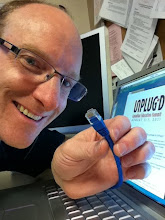Recent news articles lead me to the conclusion that cheating is the norm. My experience in the classroom tells me that educators can use these stories to generate discussion on 'Cheating in these times of Digital Media'.
Whether you consider the confessed drug use of Marion Jones, the denials of Floyd Landis, the reporting of Major League steroid users, or the 'spygate' controversy of the New England Patriots, the issue of cheating in high stakes athletics becomes less surprising by the day. Once out of the ordinary, cheating seems to be accepted (at least by co-conspirators) until someone gets caught. Then it's a few weeks of denials before tearful 'coming clean' press conferences.
This wave of reporting on cheaters in athletics, has prompted me to think about how 'normal' cheating seems to be in everyday life.
Consider the ways global citizens make use of technology in order to get 'something for nothing':
* bootlegged DVDs
* music downloading
* video game cheat codes
* iPhone hacks
* identity theft
While the consequences of getting caught doing these things varies greatly, the acceptability of digital theft has become common to many and disconcerting to a few. In David Pogue's recent post for the New York Times, The Generational Divide in Copyright Morality, he chronicles his experience in discovering how his readers and audience members sometimes fail to differentiate 'shades of grey' in digital copyright, and concludes "I do know, though, that the TV, movie and record companies’ problems have only just begun. Right now, the customers who can’t even *see* why file sharing might be wrong are still young. But 10, 20, 30 years from now, that crowd will be *everybody*. What will happen then?"
So, what does this have to do with education? Ethics in this digital age are something educators need to model if nothing else. Consider the teacher, young or old, who sometimes teaches with tools of a darker shade of grey:
* decides to play 'pirated' music from their iPod for dramatic effect;
* who 'shares' a home-burned DVD movie that dovetails with a current novel study;
* who embeds uncredited text into a PowerPoint presentation;
* who freely photocopies a published work for classroom reading;
* who uses images trawled from Google on a classroom website.
The responsibilities of modeling lawful use of creative works at the very least should require teachers to identify their sources prior to sharing them with a given class; and at best, would highlight the need for students to copyright and license their own creative works. Lawrence Lessig's recent TED talk, "How Technology is Being Strangled by the Law" highlights the fact that digital natives regularly mash media in creating new works, and that the laws governing copyright, help make us a society of law-breakers. Thanks to Wesley Fryer I've learned that a YouTube version of the talk is now available:
With cheating becoming the norm in society, and the 'find it in your hearts to forgive me' speeches filling the airwaves, educators have a golden opportunity to open classroom discussions on ethics in our time. Provided the classroom teacher is able to model and lead students in the creation of original 'non-infringing' content, the best way to move forward, may be for students to experience copyright first hand, in granting license to the non-commercial use of their own work through Creative Commons licensing.
Access an audio briefing on the Teacher 2.0 Podcast.
Monday, December 24, 2007
Subscribe to:
Post Comments (Atom)




1 comments:
There is that famous word again "Ethics". What does it mean? Is it objective, subjective or both? Is there a moral system when it comes to the Internet and the use of the tools? Who establishes it? Do we reinvent what is right and wrong? The frontier of ethics is both utilitarian and absolutist. The questions raised are both practical and philosophical. I look forward to exploring this with you. Check out my Podcast #7.
Post a Comment